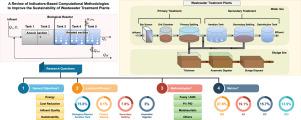基于指标的计算方法综述,以提高污水处理厂的可持续性
IF 3.9
2区 工程技术
Q2 COMPUTER SCIENCE, INTERDISCIPLINARY APPLICATIONS
引用次数: 0
摘要
水资源短缺目前是一个令人担忧的问题,未来可能会恶化。为了解决这一问题,人类活动中使用的水在重新使用或回归自然之前必须经过处理。废水在污水处理厂(WWTPs)中进行处理,污水处理厂是一个复杂的结构,消耗大量的资源,需要优化运行。许多作者提出了优化污水处理厂的计算方法,每项工作都有不同的方法和特点,但大多数都缺乏对最广泛定义的可持续性最大化的关注。此外,即使在考虑可持续性时,它也通常以间接或肤浅的方式处理,而不是作为中心目标来对待。本文提供了一个关键的文献综述的计算方法,在某种程度上,侧重于提高污水处理厂的可持续性。考虑到本文的目标,本检讨旨在回答以下主要问题:(1)拟议工作的一般目标是什么?(2)建议的技术应用于处理过程的哪些位置/阶段?(3)建议的技术中使用的主要方法和性能指标是什么?该综述指出,目前的研究重点是优化生物反应器的曝气,有限的跨污水处理厂阶段的整体和实时优化,以及缺乏可持续性指标的整合,特别是对环境和社会影响的整合。未来的研究应优先发展实时、多目标的优化框架,涵盖污水处理厂的所有阶段,并充分整合经济、环境和社会可持续性维度。本文章由计算机程序翻译,如有差异,请以英文原文为准。

A review of indicators-based computational methodologies to improve the sustainability of wastewater treatment plants
Water scarcity is currently a concerning problem and is likely to worsen in the future. To address this issue, it is essential that water used in human activities is treated before being reused or returned to nature. Wastewater is processed in wastewater treatment plants (WWTPs), which are complex structures that consume a considerable amount of resources and need to operate optimally. Many authors have proposed computational methodologies to optimize WWTPs, and each work has different approaches and characteristics, but most have in common the lack of concern with maximizing sustainability, in its broadest definition. Furthermore, even when sustainability is considered, it is typically addressed in an indirect or superficial manner, rather than being treated as a central objective. This paper provides a critical literature review of computational methodologies that, in some way, focus on improving the sustainability of WWTPs. Considering the target of the paper, this review aims to answer the following main questions: (1) What are the general objectives of the proposed works? (2) In which locations/phases of the treatment process are the proposed techniques applied? (3) What are the main methodologies and performance metrics used in the proposed techniques? The review identifies a strong focus on optimizing aeration in biological reactors, limited holistic and real-time optimization across WWTP stages, and sparse integration of sustainability metrics, especially for environmental and social impacts. Future research should prioritize the development of real-time, multi-objective optimization frameworks that encompass all WWTP stages and fully integrate economic, environmental, and social sustainability dimensions.
求助全文
通过发布文献求助,成功后即可免费获取论文全文。
去求助
来源期刊

Computers & Chemical Engineering
工程技术-工程:化工
CiteScore
8.70
自引率
14.00%
发文量
374
审稿时长
70 days
期刊介绍:
Computers & Chemical Engineering is primarily a journal of record for new developments in the application of computing and systems technology to chemical engineering problems.
 求助内容:
求助内容: 应助结果提醒方式:
应助结果提醒方式:


